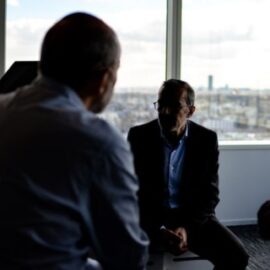

This article is an excerpt from the Shortform book guide to "What Color Is Your Parachute?" by Richard N. Bolles. Shortform has the world's best summaries and analyses of books you should be reading.
Like this article? Sign up for a free trial here .
Do you know how to interview well? Are there tips from What Color Is Your Parachute that you can use?
What Color Is Your Parachute, or the Parachute book, is a practical guide to finding the right job. It includes tips for the entire hiring process, including how to interview well.
Read on for more about the job interview process and how to interview well.
The Job Interview Process
Once your online presence or resume has secured you an employment interview, the next step of the job-hunt is to ace that interview.
There are several guidelines for the job interview process.
During an interview, an employer will be evaluating what you say and how you behave. Keep in mind that the only goal of the first interview is to get yourself a second interview—you’re not trying to get hired yet. Here are some tips for how to interview well:
1. Keep your word. If you asked for the interview, tell the interviewee how much of their time you’ll take up. Choose an oddly specific time, such as 19 minutes, because it sounds precise, and then keep to it. Set a vibrate timer for two minutes before your time limit and when it goes off, wrap up by saying that you’re sticking to your time limit and you like to keep your word. This creates trust and impresses the employer, making it one of the best interview tips. Unless the employer begs you to stay, leave on time.
2. Remember that interviews are a two-way conversation. An interview isn’t purely about marketing yourself—you should learn just as much about the employer as they learn about you. Start the interview by asking questions about the organization, and only if you like it should you move on to marketing yourself. This is one of the keys to knowing how to interview well.
3. Speak and listen in equal measures. Studies show that people who talk and listen equally are hired more than those who talk too much or listen too much. The author suspects that this is because if you talk too much, you seem like you might ignore the organization’s needs. If you listen too much, you seem like you’re trying to hide something.
4. Anticipate common questions. One of the best interview tips is being prepared for common questions. Every question an interviewer asks you is related to one of these five underlying questions:
- Why are you interested in my organization specifically?
- What will you be able to do for us? What are you good at, what do you know, and if you were hired, would you solve problems?
- Who are you? Will you fit in with the company culture?
- What’s unique about you? What makes you different from the other applicants?
- What will you want to be paid? Taking into account my budget and existing pay structure, is that possible? (There’s more information on salary negotiations in Chapter 6.)
Try to answer all questions with information that would answer some of the above questions.
Since interviewing is a two-way conversation, you’re going to have approximately the same five questions for the employer:
- What are the tasks involved with the job? Ask this question aloud.
- What are the skills you’d need in order to excel at the job? Ask this question aloud.
- Are you going to fit in with the company culture? Use your observational skills to answer this question.
- What’s unique about me that I could share? This is where you bring up your traits—the hows of your skill execution. Wait for an appropriate moment.
- Will they offer me an appropriate salary? (There’s more information on salary negotiations in Chapter 5. Don’t bring it up until it’s clear that the employer wants to hire you.)
- You may also want to ask some questions about how the company sees itself.
Employers are nearly always going to ask you to tell them about yourself. This question is a test of how you handle an open-ended situation—your answer will reflect how you might respond to open-ended challenges on the job. Here are some tips for how to interview well and answer this question specifically:
- Talk about your skills and knowledge instead of your personal history—the employer is more interested in what you can do than where you grew up.
- Emphasize that you can do the three most important skills necessary to do the job.
- Don’t respond with another question, such as asking what in particular they want to know about you. This makes you seem like you don’t have an answer and are stalling.
- Have your answer well-prepared.
5. Answer all questions within 20 seconds to two minutes. Studies have revealed that this is the ideal amount of time to spend per question. Time management is an important part of knowing how to interview well.
6. Reassure the employer that you’re not a risk. During an interview, an employer is trying to figure out if you’re going to be good for the company—bad hires are expensive. The employer may be just as nervous as you and they’re probably worried about the following in particular:
- You’ll affect the company’s or hirer’s reputation.
- You’ll have some sort of a terrible character flaw.
- You don’t have the experience or skills to do the job, or it’ll take you too long to figure out how to do it.
- You’ll only stay at the job temporarily.
- You’ll be minimally productive.
- You’ll need instructions rather than being able to act intuitively.
- You’ll take too many sick days and not work full days.
Employers have two concerns: challenges and solutions. They want you to be a solution, not a new challenge. They want you to be worth more than they pay you.
As part of your research, try to figure out who the employer would consider to be a bad employee. Then, in the interview, demonstrate that you’re nothing like the hypothetical bad employee. For example, if the employer has had problems in the past with people showing up to work late, arrive early for your interview.
7. Behave appropriately. An employer is observing all your actions on a small scale (for example, whether or not you’re fidgeting) because these actions might transfer into your large-scale behavior, such as how you do a job. It might take them only 30 seconds to 2 minutes to see something small that will bias them against you. Therefore, pay attention to details, otherwise knowing how to interview well won’t pay off. Employers will be looking at:
- Your personal grooming. Take a shower before your interview, wear clean, professional clothes, brush your teeth, don’t wear too much perfume or cologne, and if you have tattoos, consider covering them if you don’t think the employer will approve.
- Nervous habits. Make eye contact, give a strong handshake, and don’t fidget. If you don’t know what your nervous habits are, videotape yourself during a practice interview and then watch the video with the sound turned off so you can concentrate on how you’re acting non-verbally.
- Confidence. Speak audibly, speak unhesitatingly, give more than one word as an answer, don’t interrupt, and don’t be critical of yourself.
- Politeness. Be polite to everyone you encounter in the interviewing process, whether they’re the receptionist, a server if it’s a lunch meeting, or the interviewer themselves. Don’t be critical of anyone, don’t order alcohol, and remember to thank everyone, both as you leave and by sending a thank-you card later.
- Personal values. Don’t demonstrate negative character traits (arrogant, lazy, whiny, dishonest, irresponsible, unenthusiastic, unstable, and so on). Do demonstrate positive ones. For example, if you mention that you’re impressed by an employer’s safety record, that shows that you value safety.
- Smoking. A Seattle University study found that if two people are equally qualified but one smoked and one didn’t, the smoker will get the job only 6% of the time.
Some of these judgments will feel petty and unfair, but that’s just how the world works and being aware of them is one of the best interview tips.
8. Never speak badly of anyone. If you bad-mouth previous co-workers or employers, that suggests that you might do the same about your potential new employer and co-workers. If you had a conflict with a previous employer that you know will come up eventually, try to address it in advance.
- For example, say something along the lines of, this never happens, but for some reason, my previous employer and I just didn’t click.
9. Concentrate on the future. Employers want to know how you’ll behave if you’re hired. The only way of finding that out is to ask about how you’ve acted in the past and assume you’ll act the same way in the future. Therefore, every time you answer a question, try to anticipate what future behavior they’re trying to predict and address it.
- For example, if an employer asks if you’ve done similar work before, she’s probably worried you don’t have the experience or skills to do the job. Answer by mentioning your transferable skills and say that you’ve learned quickly in the past.
This approach works on illegal questions (race, sex, age, and so on) too. For example, if an employer asks about your health, probably what they’re really asking is how much work you’ll be able to get done. You can address that question instead by talking about your productivity.
10. Assess the interview’s progress. Typically, an employer will start by asking you about the distant past (education) and then move slowly forward in time until the distant future (where do you see yourself in ten years). Once you start talking about the future, then it’s time to ask more questions about the job such as what the duties are, who you would report to, and how training works.
11. Ask final questions. After your final interview, if you like the employer and you think they like you, ask about the next steps. You can ask outright if they’ll offer you the job. Or, you can ask when you’ll hear from them and if you can follow up if you don’t hear. Some employers don’t like being asked about follow-ups (it opens the door for nagging), but it can also be a safety net—they’re not responsible for remembering to get back to you.
At the very end of the interview, thank your interviewer and shake her hand firmly. Ask her, and everyone you met, for their business cards, or, if they don’t have cards, ask them to write down their names and addresses. You’ll use that information to spell their names properly on the thank-you cards you’re going to send in the next step.
How to Follow Up After
There’s one to-do right after an interview: Send thank-you notes to everyone you meet, not only the person you interviewed with. There are six reasons to send a thank-you note:
- It reminds people who you are (many people may have been interviewed).
- It reinforces that you have people skills.
- It reinforces your interest in the job.
- It gives the interviewer something to show anyone else who will be involved in the hiring decision.
- It’s a chance to mention anything you forgot during the interview or to correct a bad impression.
- It’s a chance to mention that you’d appreciate it if an interviewer could recommend another avenue if the interview didn’t go well.

———End of Preview———
Like what you just read? Read the rest of the world's best book summary and analysis of Richard N. Bolles's "What Color Is Your Parachute?" at Shortform .
Here's what you'll find in our full What Color Is Your Parachute? summary :
- How to not just find a job, but find a job you love
- Why traditional resumes don’t find you the right job
- The 7 steps to identifying your ideal career






